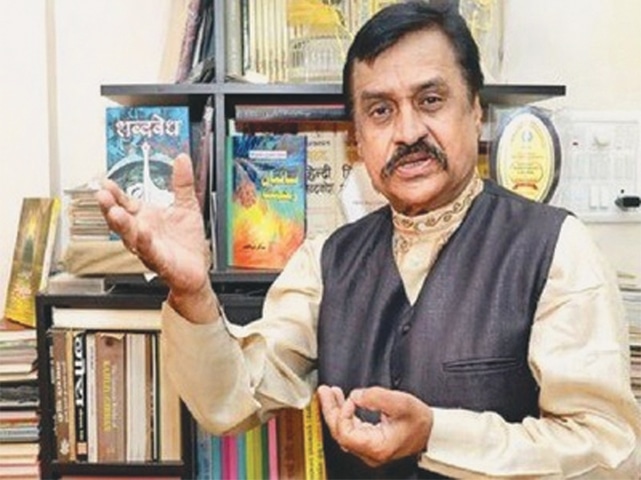
MUMBAI: At a time of anxieties over prayer locations and portraits of historic figures, sitting in a quiet, sea-facing flat in Mumbai’s Colaba, Pandit Ram Sagar Prithvipal Tripathi, or simply Sagar Tripathi, respectfully opens Saibaan-i-Rehmat (Tent of Mercy), his collection of devotional poems penned in praise of Prophet Muhammad (PBUH).
The 68-year-old, who hails from a family that patronises the Ram Lalla Vinyas, a temple trust in Ayodhya, is also world president of the Vishwa Brahmin Parishad.
But that’s not what he’s known widely for. He has become a famous face at mushairas for his poetry, and in particular for always opening his session with a hamd and a naatiya kalaam.
In his house, dozens of awards and citations that he’s won for his works jostle for space with copies of the Holy Quran, biographies of the Prophet, the Bhagvad Gita and the Ramayana. Behind a huge sofa are placed several prayer mats that he spreads for Muslim guests who want to pray.
Tripathi’s collection of devotional poems unambiguously declares not just his devotion to the Prophet, but also his yearning for peace and communal harmony. His verses, in Urdu and Devanagri scripts, epitomise the famed Ganga-Jamuni tehzeeb (composite culture). They celebrate a tradition where Hindus and Muslims don’t just tolerate each other; they coexist and cooperate.
“Prophet Muhammad [PBUH] doesn’t belong to Muslims alone. He is for humanity, and there is nothing wrong if I seek some blessings from him,” says Tripathi.
He captures this belief in a couplet: Sirf ik quom ke nahin hain woh / Rahmate aalimeen hain aaqa (He doesn’t belong to just one community / He is mercy for the universe).
Born in a village in UP’s Sultanpur district, Tripathi says there was a lot in his background to prepare him for a career as a poet, though he earns from his business, property investments and shares.
When he was an undergraduate and masters’ student at the Allahabad University, he came under the tutelage of the famous poet Raghupati Sahai Firaq Gorakhpuri. He fell in love with poetry and his passion grew as he got dazzled by the leading lights of Urdu literature.
Tripathi moved to Mumbai in the 1970s primarily “to make money”. “I earned loads of money but always found a hollowness within me. Poetry filled this gap as it became a therapy, a way to get catharsis,” he says. He donates the money from his book sales to fund the education of poor Muslim children.
As a member of a pandit family from Ayodhya, what does he have to say about the long-delayed resolution of the Ramjanmabhoomi-Babri Masjid dispute? “I don’t want to say much on the dispute as it is sub judice,” he says, “but it can be resolved if people stop making it an ego issue and politicians are kept away from it.” —By arrangement with the Times of India
Published in Dawn, May 28th, 2018













































Dear visitor, the comments section is undergoing an overhaul and will return soon.